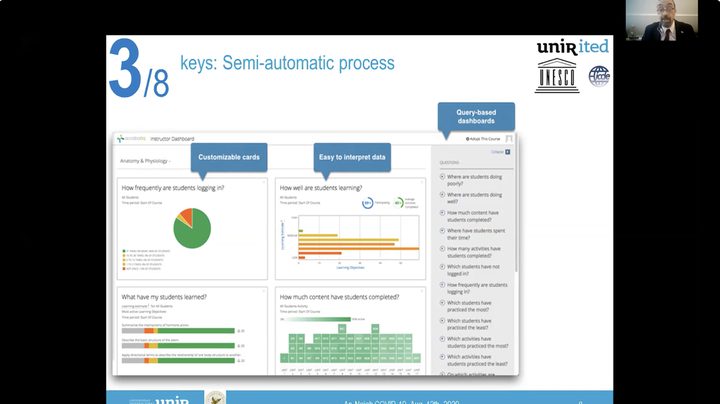An-Najah News - An-Najah National University held a live webinar titled: "Palestine During COVID-19: Impact, Response, and Co-Existence" under the theme: Education and Research.
The webinar aimed at tackling both the immediate and long term effects of COVID-19 on the Occupied Palestinian Territories.
Dr. Kherieh Rassas, Vice President for International Development and External Affairs at the University, opened the webinar, and welcomed the participants.
She talked about the aim of this webinar which is seeking ways to overcome difficulties and challenges imposed by COVID-19. She said: "We are mostly concerned about the quality of education during the pandemic.
she added" I hope this session and other sessions co-create academic discussions, and pave the way to a better understanding of the threats of this pandemic".
She added: "One cannot deny that the pandemic had dramatically changed the substance and platforms of education. The rise of online learning has made education digital and remote".
Dr. Rassas also talked about An-Najah’s mission, history and the challenges that face higher education in Palestine.
In addition, she talked about the University's journey with e-learning and introduced An-Najah's E-Learning Center and open courses offered by the center.
Dr. Raed Barakat, Representative of the Minister of Higher Education and Scientific Research in Palestine, welcomed the attendees and talked about the closure of all schools and universities in Palestine as a protective measure to avoid the spread of the Corona Virus known as COVID-19.
He explained how the Ministry of Higher Education and Scientific Research in Palestine responds to COVID-19 crisis and the emergency measures which Palestine declared over corona virus.
He also talked about the obstacles to e-learning in Palestine which mainly involve infrastructure, weak internet networks, and insufficient awareness among teachers, students and their families of how to deal with technology and get the most out of e-learning courses.
He added:" The Ministry of Education immediately launched its National Response Plan for COVID-19 where distance learning was highlighted as an alternative solution to ensure the continuation of learning to their students".
The first session was about the impact of COVID-19 on Research, and was moderated by Dr. Nidal Dwaikat, Deputy President for Planning, Development and Quality Assurance, and Assistant Professor at the Industrial Engineering Department at An-Najah University.
It included two presentations given by Dr. Ashwin Fernandes, Regional Director for QS Quacquarelli Symonds in Middle East, North Africa & South Asia, and Prof. Waleed Sweileh, Dean of Scientific Research, Professor of Pharmacy and Pharmacology at An-Najah University.
In his presentation, Dr. Fernandes talked about QS mission which is to enable motivated people anywhere in the world to fulfill their potential through educational achievement, international mobility, and career development.
Dr. Fernandes' presentation included the following topics: the impact of COVID-19 on the various sectors, the impact of COVID-19 on scientific community, the effects of COVID-19 on funds and events, research opportunities, institutional responsibilities and challenges, and responsibilities and challenges of the scientific communities.
The second session was about the Impact of COVID-19 on Pedagogical Methods and the Role of Online Learning. It was moderated by Dr. Saida Affouneh, Dean of the Faculty of Educational Sciences an Teacher Training and Director of the E-Learning Center at An-Najah University.
It included three presentations given by Prof. John Traxler, Professor of Digital Learning, University of Wolverhampton, Prof. Daniel Burgos, Vice-chancellor for Research & Technology (UNIR Research), as well as UNESCO Chair on eLearning, at the International University of La Rioja (UNIR), and Prof. Badrul H. Khan| World-renowned speaker, author, educator and consultant in the field of e-learning and educational technology.
The third session included two presentations about virtual exchange. The session was moderated by Dr. Yousef Sabbah, Assistant Professor and e-Learning expert at Al-Quds Open University.
The presentations were given by Dr. Nedal Jayousi, Director of the National Erasmus+ Office in Palestine, Sara Pittarello, UNIcollaboration, Amany Ben Lakhdar, Senior Partnerships and Outreach Coordinator, Soliya, and Rawan Tahboub, Erasmus+ VE Facilitator and Program Officer at Sharing Perspectives Foundation.






